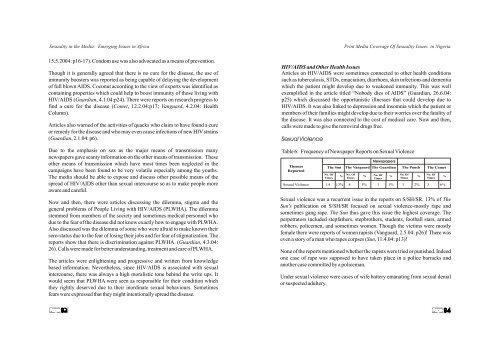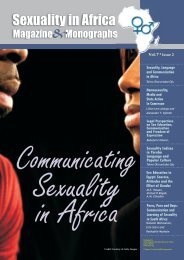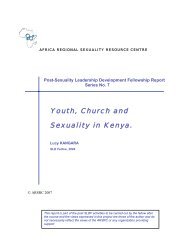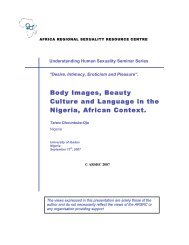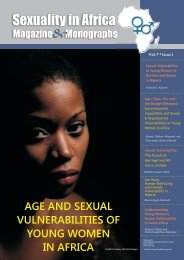Sexuality in Media: Emerging Issues in Africa - Africa Regional ...
Sexuality in Media: Emerging Issues in Africa - Africa Regional ...
Sexuality in Media: Emerging Issues in Africa - Africa Regional ...
Create successful ePaper yourself
Turn your PDF publications into a flip-book with our unique Google optimized e-Paper software.
<strong>Sexuality</strong> <strong>in</strong> the <strong>Media</strong>: Emerg<strong>in</strong>g <strong>Issues</strong> <strong>in</strong> <strong>Africa</strong><br />
15.5.2004: p16-17). Condom use was also advocated as a means of prevention.<br />
Though it is generally agreed that there is no cure for the disease, the use of<br />
immunity boosters was reported as be<strong>in</strong>g capable of delay<strong>in</strong>g the development<br />
of full blown AIDS. Coconut accord<strong>in</strong>g to the view of experts was identified as<br />
conta<strong>in</strong><strong>in</strong>g properties which could help to boost immunity of those liv<strong>in</strong>g with<br />
HIV/AIDS (Guardian, 4.1.04:p24). There were reports on research progress to<br />
f<strong>in</strong>d a cure for the disease (Comet, 12.2.04:p17; Vanguard, 4.2.04: Health<br />
Column).<br />
Articles also warned of the activities of quacks who claim to have found a cure<br />
or remedy for the disease and who may even cause <strong>in</strong>fections of new HIV stra<strong>in</strong>s<br />
(Guardian, 2.1.04: p6).<br />
Due to the emphasis on sex as the major means of transmission many<br />
newspapers gave scanty <strong>in</strong>formation on the other means of transmission. These<br />
other means of transmission which have most times been neglected <strong>in</strong> the<br />
campaigns have been found to be very volatile especially among the youths.<br />
The media should be able to expose and discuss other possible means of the<br />
spread of HIV/AIDS other than sexual <strong>in</strong>tercourse so as to make people more<br />
aware and careful.<br />
Now and then, there were articles discuss<strong>in</strong>g the dilemma, stigma and the<br />
general problems of People Liv<strong>in</strong>g with HIV/AIDS (PLWHA). The dilemma<br />
stemmed from members of the society and sometimes medical personnel who<br />
due to the fear of the disease did not know exactly how to engage with PLWHA.<br />
Also discussed was the dilemma of some who were afraid to make known their<br />
sero-status due to the fear of los<strong>in</strong>g their jobs and for fear of stigmatization. The<br />
reports show that there is discrim<strong>in</strong>ation aga<strong>in</strong>st PLWHA. (Guardian, 4.3.04:<br />
26). Calls were made for better understand<strong>in</strong>g, treatment and care of PLWHA.<br />
The articles were enlighten<strong>in</strong>g and progressive and written from knowledge<br />
based <strong>in</strong>formation. Nevertheless, s<strong>in</strong>ce HIV/AIDS is associated with sexual<br />
<strong>in</strong>tercourse, there was always a high moralistic tone beh<strong>in</strong>d the write ups. It<br />
would seem that PLWHA were seen as responsible for their condition which<br />
they rightly deserved due to their <strong>in</strong>ord<strong>in</strong>ate sexual behaviours. Sometimes<br />
fears were expressed that they might <strong>in</strong>tentionally spread the disease.<br />
HIV/AIDS and Other Health <strong>Issues</strong><br />
Articles on HIV/AIDS were sometimes connected to other health conditions<br />
such as tuberculosis, STDs, emaciation, diarrhoea, sk<strong>in</strong> <strong>in</strong>fections and dementia<br />
which the patient might develop due to weakened immunity. This was well<br />
exemplified <strong>in</strong> the article titled “Nobody dies of AIDS” (Guardian, 26.6.04:<br />
p25) which discussed the opportunistic illnesses that could develop due to<br />
HIV/AIDS. It was also l<strong>in</strong>ked to depression and <strong>in</strong>somnia which the patient or<br />
members of their families might develop due to their worries over the fatality of<br />
the disease. It was also connected to the cost of medical care. Now and then,<br />
calls were made to give the retroviral drugs free.<br />
Sexual Violence<br />
Table 6: Frequency of Newspaper Reports on Sexual Violence<br />
Themes<br />
Reported<br />
The Sun The Vanguard The Guardian The Punch The Comet<br />
No. Of<br />
Times<br />
%<br />
Pr<strong>in</strong>t <strong>Media</strong> Coverage Of <strong>Sexuality</strong> <strong>Issues</strong> <strong>in</strong> Nigeria<br />
No. Of<br />
Times<br />
%<br />
Newspapers<br />
No. Of<br />
Times<br />
No. Of<br />
No. Of<br />
% %<br />
%<br />
Times<br />
Times<br />
Sexual Violence 14 13% 4 5% 1 1% 1 2% 3 6%<br />
Sexual violence was a recurrent issue <strong>in</strong> the reports on S/SH/SR. 13% of The<br />
Sun's publication on S/SH/SR focused on sexual violence-mostly rape and<br />
sometimes gang rape. The Sun thus gave this issue the highest coverage. The<br />
perpetrators <strong>in</strong>cluded stepfathers, stepbrothers, students, football stars, armed<br />
robbers, policemen, and sometimes women. Though the victims were mostly<br />
female there were reports of women rapists (Vanguard, 2.5.04: p26)! There was<br />
even a story of a man who rapes corpses (Sun, 11.4.04: p13)!<br />
None of the reports mentioned whether the rapists were tried or punished. Indeed<br />
one case of rape was supposed to have taken place <strong>in</strong> a police barracks and<br />
another case committed by a policeman.<br />
Under sexual violence were cases of wife battery emanat<strong>in</strong>g from sexual denial<br />
or suspected adultery.


